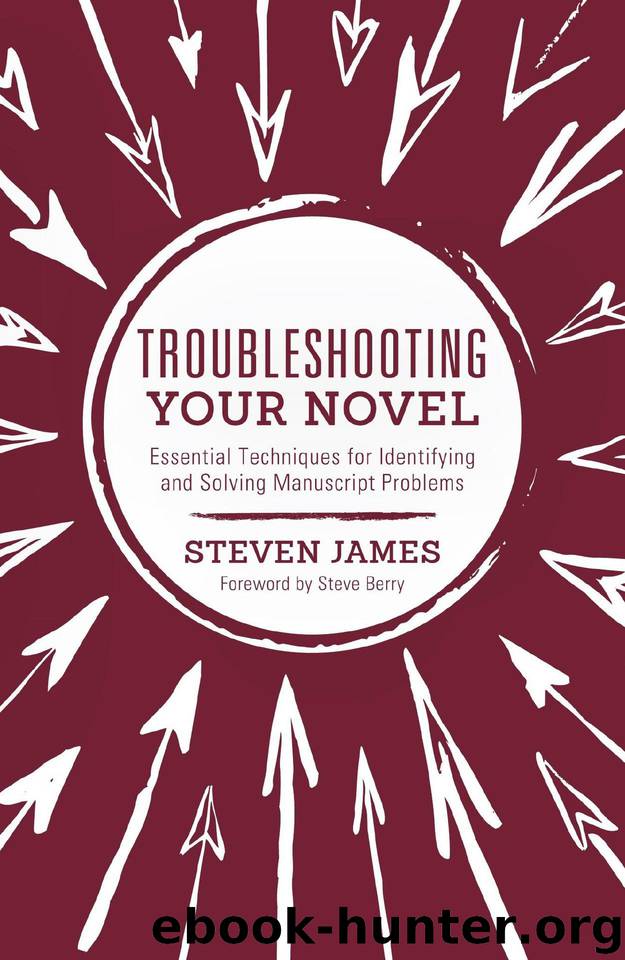Troubleshooting Your Novel: Essential Techniques for Identifying and Solving Manuscript Problems by Steven James

Author:Steven James
Language: eng
Format: mobi, epub
Publisher: F+W Media
Published: 2016-09-20T00:00:00+00:00
Are people basically good, basically evil, or born as clean slates?
What plays a bigger role in defining who we are—nature or nurture? What evidence is there for that conclusion?
A character might not always live up to his moral aspirations. Sometimes his weaknesses will get the best of him. In real life, temptation hounds all of us. At times, we do what we know we shouldn’t. Sometimes we act without thinking. We say things we regret. We hurt those we love.
This will happen to your protagonist as well.
Dig into the implications of his moral meltdowns. The actions he takes in their aftermath will reveal his highest priorities.
For example, the committed family man ends up sleeping with his co-worker on a business trip after they’ve both had too much to drink. Okay—so what happens next?
His actions here, at this point, reveal more about his priorities than his compromising choice did. Does he confess to his wife the truth and risk losing her and hurting the children, or does he keep his one-night stand a secret in order to protect them? Does he quit his job so he won’t be tempted in that way with that woman again?
What does he do? What does that cause?
His willingness to go through a months-long journey toward reconciliation speaks louder about what matters to him than his night of indiscretion. Wanting to have sex proves he’s an animal. Owning up to the implications of his infidelity proves he’s a man.
Think in terms of passions, priorities, and addictions. Every one of these can be an asset or a liability. Where does her zeal lead her in the wrong direction?
If we’re passionate about the wrong things, we’ll lose our way. If we prioritize the wrong things, we’ll hurt those closest to us. If we’re addicted to the wrong things (i.e., vices rather than virtues such as joy, love, hope, thanksgiving), we’ll end up destroying ourselves and will probably take others with us over the cliff.
Sometimes our beliefs are a result of our upbringing; sometimes we develop them despite our upbringing. The origin of your character’s beliefs matters less in this story than the effect they have on his decisions right now.
Readers are more interested in what your character does because of his beliefs than what he claims to believe. Examining beliefs is best done through the lens of actions. Keeping that in mind, look closely at your character’s guilt and shame—the choices that caused them and the consequences they have.
Download
Troubleshooting Your Novel: Essential Techniques for Identifying and Solving Manuscript Problems by Steven James.epub
This site does not store any files on its server. We only index and link to content provided by other sites. Please contact the content providers to delete copyright contents if any and email us, we'll remove relevant links or contents immediately.
Asking the Right Questions: A Guide to Critical Thinking by M. Neil Browne & Stuart M. Keeley(5752)
Autoboyography by Christina Lauren(5226)
Eat That Frog! by Brian Tracy(4518)
Dialogue by Robert McKee(4385)
Sticky Fingers by Joe Hagan(4187)
Journeys Out of the Body by Robert Monroe(3613)
Annapurna by Maurice Herzog(3464)
Full Circle by Michael Palin(3443)
Schaum's Quick Guide to Writing Great Short Stories by Margaret Lucke(3369)
Elements of Style 2017 by Richard De A'Morelli(3338)
The Art of Dramatic Writing: Its Basis in the Creative Interpretation of Human Motives by Egri Lajos(3058)
Atlas Obscura by Joshua Foer(2950)
Why I Write by George Orwell(2944)
The Diviners by Libba Bray(2927)
The Fight by Norman Mailer(2924)
In Patagonia by Bruce Chatwin(2919)
The Mental Game of Writing: How to Overcome Obstacles, Stay Creative and Productive, and Free Your Mind for Success by James Scott Bell(2897)
Venice by Jan Morris(2568)
The Elements of Style by William Strunk and E. B. White(2469)
